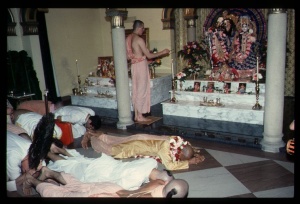740401 - Lecture Festival Appearance Day, Lord Ramacandra, Rama-Navami and Cornerstone Laying - Bombay: Difference between revisions
No edit summary |
RasaRasika (talk | contribs) m (Text replacement - "Prabhupāda:" to "'''Prabhupāda:'''") |
||
| Line 20: | Line 20: | ||
Prabhupāda: . . . Rāma-navamī, the birthday of Lord Rāmacandra, Bhagavān. In the ''Brahma-saṁhitā'' it is mentioned: | '''Prabhupāda:''' . . . Rāma-navamī, the birthday of Lord Rāmacandra, Bhagavān. In the ''Brahma-saṁhitā'' it is mentioned: | ||
:''rāmādi-mūrtiṣu kalā-niyamena tiṣṭhan'' | :''rāmādi-mūrtiṣu kalā-niyamena tiṣṭhan'' | ||
Revision as of 02:20, 13 September 2023

A.C. Bhaktivedanta Swami Prabhupada
Prabhupāda: . . . Rāma-navamī, the birthday of Lord Rāmacandra, Bhagavān. In the Brahma-saṁhitā it is mentioned:
- rāmādi-mūrtiṣu kalā-niyamena tiṣṭhan
- nānāvatāram akarod bhuvaneṣu kintu
- kṛṣṇaḥ svayaṁ samabhavat paramaḥ pumān yo
- govindam ādi-puruṣaṁ tam ahaṁ bhajāmi
- (Bs. 5.39)
Govinda, Kṛṣṇa, is the ādi-puruṣa, original Personality of Godhead. In the Bhagavad-gītā Kṛṣṇa says, mattaḥ parataraṁ nānyat (BG 7.7). Ahaṁ sarvasya prabhavaḥ (BG 10.8). In other śāstras also, like Śrīmad-Bhāgavatam, it is said, kṛṣṇas tu bhagavān svayam. There are many expansions of Kṛṣṇa, but the original person, kṛṣṇas tu . . . ete cāṁśa-kalāḥ puṁsaḥ kṛṣṇas tu bhagavān svayam (SB 1.3.28). So He is existing with His expansions. Lord Rāmacandra is also one of the expansions. Rāmādi-mūrtiṣu kalā-niyamena tiṣṭhan (Bs. 5.39). All these expansions are existing eternally. There is no inferiority or superiority. All the expansions are of the same potency, same power. The example is given like this candle. One candle is now burned, and you can get another candle burned, you can get third candle burned, ignite. But all the candles are of the same power. The difference is that one you can call the original candle, and the others you can call the second candle, the third candle, the fourth candle. But so far the candle power is concerned, there is no difference. Pūrṇasya pūrṇam ādāya pūrṇam evāvaśiṣyate (Iso Invocation). Kṛṣṇa, or the Supreme Lord, can expand Himself, eko bahu syāma, in millions and trillions of forms, but all of them are of the same potency. But the potencies are sometimes exhibited according to the time and circumstance.
So on this auspicious day of appearance day of Lord Rāmacandra, we are taking this opportunity of foundation of the cornerstone of our temple in this Bombay center. And it is very kind of Mrs. Nair, A. B. Nair, that she has given us this chance, along with her husband. So, so far we are concerned, we are preachers. We are preaching all over the world. We don't require any palatial building or very comfortable apartment. But because it is a preaching center, in order to invite respectable persons we require nice building, nice temple. Just like Rūpa Gosvāmī, our predecessor ācārya, he left his ministership, government post, and became a mendicant. He was living underneath a tree every night. Not permanently underneath a tree: tonight one tree, next night another tree. But when he was approached by King Mānsiṅgh, the commander-in-chief of Emperor Akbar . . . in those days rich men, big men, they were God conscious, and they wanted to do something for God's service. So King Mānsiṅgh approached Rūpa Gosvāmī, if he could do any service. So Rūpa Gosvāmī, he was living under the tree, so what service he expected from King Mānsiṅgh? He said that, "If you want to do some service, do it for Kṛṣṇa." So he advised him to construct a temple at Vṛndāvana.
Those who have visited Vṛndāvana, that temple is still existing in broken state. It was seven storied. The four stories have been broken by Aurangzeb. But whatever three stories are still remaining, if we want to construct such type of temple, it will require at least four crores of rupees, not less than that. So in South India also, there are many big, big temples. It is not possible to construct such temples at the present moment. It is very expensive. But in our country, all the kings and rich men, they were interested in constructing temple. At the present moment, the tendency is practically absent. In big, big cities, development, improvement is going on, but very few people are constructing temple. This tendency of godlessness is increasing all over the world. In European countries also, America, first when I visited one county . . . it is known as Butler. So Butler County, it is a very small county. Still, immediately I saw there are about half a dozen churches, very big, big churches. They were very old churches. In America also and England, there are many churches. But people have lost interest. They are no more going to the churches. And the churches are now for sale. We have purchased one or two of them.
So this is the position of the human society, not only in India but in other parts of the continent . . . world. They are gradually losing the interest in God consciousness. This is not very good sign. So our this present movement is to invoke the dormant God consciousness all over the world. Kṛṣṇa consciousness means God consciousness. When I started this mission, registered this name, International Society for Kṛṣṇa Consciousness, some of our friends said that, "Why don't you make it 'International Society for God Consciousness?' " (break) (end)
- 1974 - Lectures
- 1974 - Lectures and Conversations
- 1974 - Lectures, Conversations and Letters
- 1974-04 - Lectures, Conversations and Letters
- Lectures - India
- Lectures - India, Bombay
- Lectures, Conversations and Letters - India
- Lectures, Conversations and Letters - India, Bombay
- Lectures - Festival
- Lectures - Cornerstone Ceremonies
- Audio Files 10.01 to 20.00 Minutes